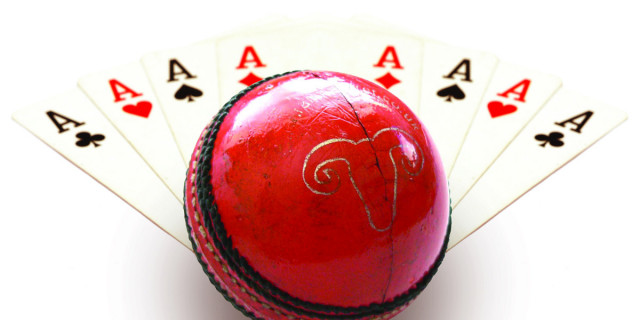Cricket scandal: Last roll of the dice
Rationality has been the first victim in the wake of the spot-fixing allegations against the Pakistan cricket team.

Former cricketer Aamer Sohail voiced a desire on live television that the players, if found guilty, be hanged upside down. A petition has been filed in the Lahore High Court requesting that the players be charged with treason. Cricket fans are not in a mood to be reflective, but reflect we must. Before we can even begin to fix the problem of corruption in cricket, we have to understand what motivates our players to risk their reputations and livelihood. And even more importantly, we need to understand the global gambling industry — both legal and outlawed.
No one denies that a massive, outlawed gambling industry exists in Pakistan, with its hub in Lahore. What is in dispute is the size of the industry. Those connected with it bandy about numbers in the trillions of rupees. The police say it is closer to Rs50 billion a year. Since gambling in Pakistan takes place in the shadows it is hard to give, with any authority, an exact figure.
While sports betting is currently making all the headlines, gambling in Pakistan encompasses just about every human activity that is conducive to wagering. Betting on the numbers that will be drawn on State Bank prize bonds is particularly popular, especially on Chaand Raat. The night before Eid happens to coincide both with the announcement of prize bonds by the State Bank and a time when people are in need of quick and ready cash. Prize bonds are identified by four-digit numbers and those who bet on those numbers win cash equal to the amount of the prize bond, with the bookie taking a 10 to 15 per cent commission from that amount.
Lahore is not just the centre of gambling but also coincidentally, of Pakistan cricket. Last year, SP Lahore Zeeshan Asghar admitted that there were over 800 gambling joints in the city and said that the police had been unable to take action against them as the police was fighting militancy in the city. He promised that a drive would be launched against gambling in the city soon. This hasn’t happened yet.
These gambling joints, though a hive of card games and betting on cricket and horse racing, are not big enough to have the clout or financial means to bribe players into throwing matches. The true powerhouses of gambling in Pakistan, who accept bets in the millions of rupees, hide behind layers of technology and middlemen. Odds are transmitted and wagers placed by SMS. Money changers, in the employ of the bookies, accept bets and pay out winners. These faceless men, who are believed to be based in Pakistan, India and Dubai, are believed to be those who can influence the results of matches.
India is finally taking its first tentative steps to tackling the problem of match-fixing by floating a suggestion that sports betting be legalised. Just like with the repeal of prohibition in the US in the 1930s, this would drive organised crime syndicates out of the sports betting business and allow the government to regulate the industry.
While the popularity of sports betting in Pakistan has undoubtedly played a role in the current crisis, unlike India, legalising and regulating the industry here is improbable due to custom. In Britain, for example, sports betting thrives and bookies make so much money legally that they have no incentive to fix the outcomes of sporting events.
There are two main venues for sports betting in Britain: bricks and mortar betting shops and online sportsbooks. Both are legal and regularly audited under law. Some bricks and mortar betting companies like Ladbrokes and William Hill and online sportsbooks like BetFair have become so large that their shares are floated on the London Stock Exchange.
It is the respectability of bookies in Britain that make them potential allies in the fight against sports corruption. They know that if they are caught trying to fix matches for financial gain they will lose their licenses and a billion-pound industry will be brought to its knees.
Additionally, legitimate sports betting enterprises make their data-gathering abilities available to law-enforcement officials. Thus, if betting patterns vary from the norm, it provides the police with information to act on. This is exactly what happened in 2007 when there was a surge of betting against a top 10 tennis player Nikolay Davydenko who was a set up against a player who was not even in the top 100. After the bets were placed, Davydenko suffered a surprising meltdown and lost a match he should have comfortably won. Although police investigations into the match were inconclusive, Davydenko’s reputation suffered and the tennis world took a closer look at match-fixing.
This approach would not have worked in the case of spot-fixing for which three Pakistani cricketers, Salman Butt, Mohammad Asif and Mohammad Aamir, have been credibly accused. The incidents of the no-balls at Lord’s involved the subcontinent betting mafia, which can only be brought down by police work. For honest punters, though, a legal alternative exists in Britain, one that can allow for the thrills of gambling without ruining the integrity of sports.
Published in The Express Tribune, September 19th, 2010.



















COMMENTS
Comments are moderated and generally will be posted if they are on-topic and not abusive.
For more information, please see our Comments FAQ